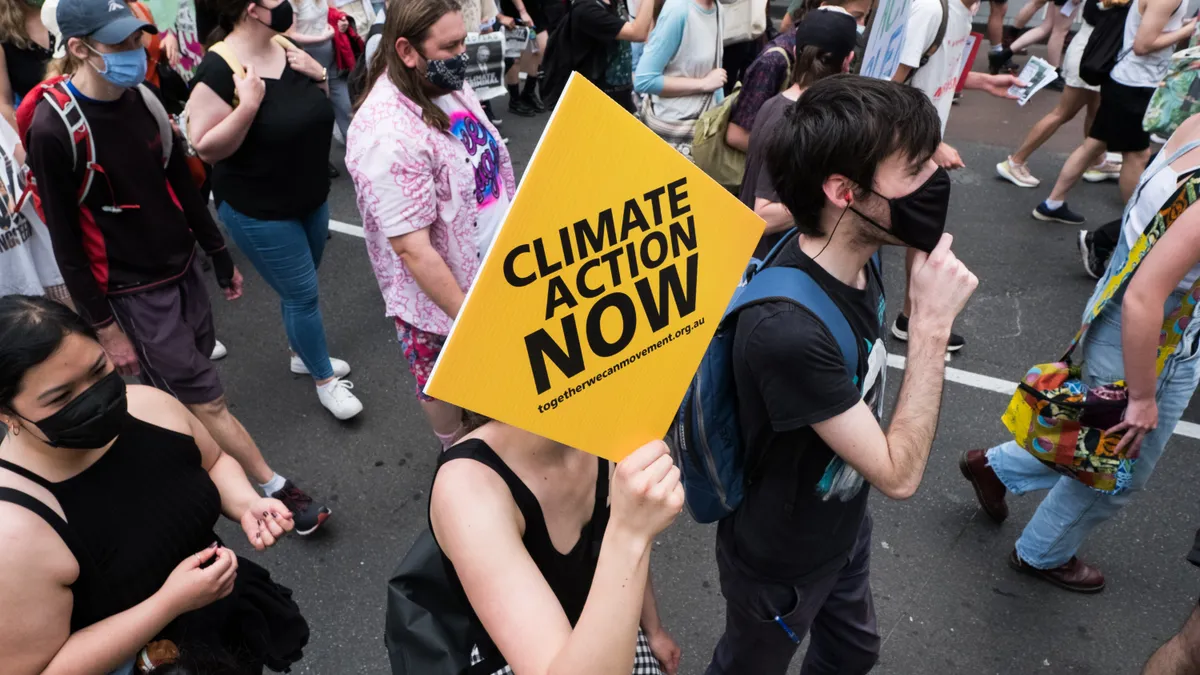Dive Brief:
- Global greenwashing cases filed between June 2023 and June 2024 declined 12% across all sectors year-over-year, representing the first time greenwashing has fallen in the past six years, according to a report unveiled Wednesday by ESG data and research firm RepRisk.
- The third edition of RepRisk’s report found that while overall cases have dipped, the number of high-severity cases rose by 30%. Additionally, while cases in the European Union experienced a notable drop, U.S. cases saw a slight increase over the year after previously showing a brief downward trend.
- “There's certainly a global undercurrent of ‘greenhushing,’ so companies are being more cautious about how they communicate about their environmental claims specifically, but also about their ESG efforts more broadly,” RepRisk Chief Commercial Officer Alexandra Mihailescu Cichon told ESG Dive Thursday. “We also see the regulatory signals in the U.S. and the regulatory developments in Europe that have also started to work to reduce the number of greenwashing risks.”
Dive Insight:
RepRisk’s latest report found 1,841 documented events of misleading communications by companies, with 56% of those — 1,038 — related to environmental claims, constituting greenwashing. Private companies made up the bulk of the greenwashing cases, representing 70% of the instances of greenwashing, compared to 30% by public companies.
The report’s findings represent a partial reversal of last year’s findings, when RepRisk found that greenwashing was growing in both frequency and severity. Enforcement signals sent by U.S. regulatory agencies like the Securities and Exchange Commission — including a $25 million greenwashing settlement with investment firm DSW — and regulations in the EU focused on scrutinizing companies sustainability and environmental claims and progress have helped turn the tide.
“Stakeholders are more aware of greenwashing risk than ever before,” RepRisk CEO Philipp Aeby said in an Oct. 9 press release. “While regulators have successfully pushed forward legislation to deter greenwashing, the risk will keep evolving as new forms emerge, leaving companies open to reputational damage which impacts their bottom line.”
While the number of cases decreased, the severity of those cases increased. Additionally, the report found that 30% of companies linked to greenwashing between 2022-23 were repeat offenders in 2024. In the U.S., 42% of companies linked to greenwashing cases last year also appeared in the 2024 report. Mihailescu Cichon said that the severity of cases and number repeat are linked, and repeat offenders potentially represent “systematic cases.”
“It suggests that greenwashing is seen as a material issue that companies are actively looking to mitigate exposure to,” Mihailescu Cichon said in an interview. “The cases that are in the headlines are ones that unfold over time, and they could be potentially a systematic issue.”
The banking and financial services industry saw a 70% increase in greenwashing claims in last year’s report, but saw a 20% year-over-year decrease in 2024.
The oil and gas sector remains the sector most-associated with greenwashing claims — as it has every year since 2019 — representing 22% of greenwashing claims in 2024, or 332 incidents. However, the report also notes that food and beverage companies have been under increased scrutiny for their sustainability claims.
The report noted a September ruling by the D.C. Circuit of Appeals that Coca-Cola must face a greenwashing lawsuit from nonprofit Earth Island Institute over whether it has overstated the role sustainability and recycling play in its business practices. The New York attorney general also sued PepsiCo in a first-of-its-kind lawsuit last November, looking to hold the food and beverage company responsible for plastic pollution.
Greenwashing trends in the U.S. have differed in trajectory from its European counterparts. After a peak in greenwashing cases in 2022, cases fell 10% in 2023 before this year’s report documented a 6% increase. Additionally, the number of high-severity cases skyrocketed 114% in the U.S., while medium- and low-severity cases fell around 15% and 34% respectively, mirroring global trends.
While the report finds that the increased regulation and scrutiny may be helping drive down the instances of greenwashing, the report said that could also bring the risk of an enhanced movement towards “greenhushing.”
Mihailescu Cichon said the dimming down of ESG and sustainability communication by companies is part of a “recalibration” after ESG became a mainstream topic around 2020, which led to increased regulation surrounding such communications. Additionally, she and Aeby agreed that the use of external sources to evaluate a company’s claims are essential.
“No matter the regulation, no matter the disclosure framework … we think there'll always be a need for investors and for companies to see what's behind those disclosures and reporting,” Mihailescu Cichon said. “That's where data based on sources external to a company — away from the reporting, away from the disclosures — will serve as a mirror and will help investors and companies assess whether companies are really walking their talk.”












